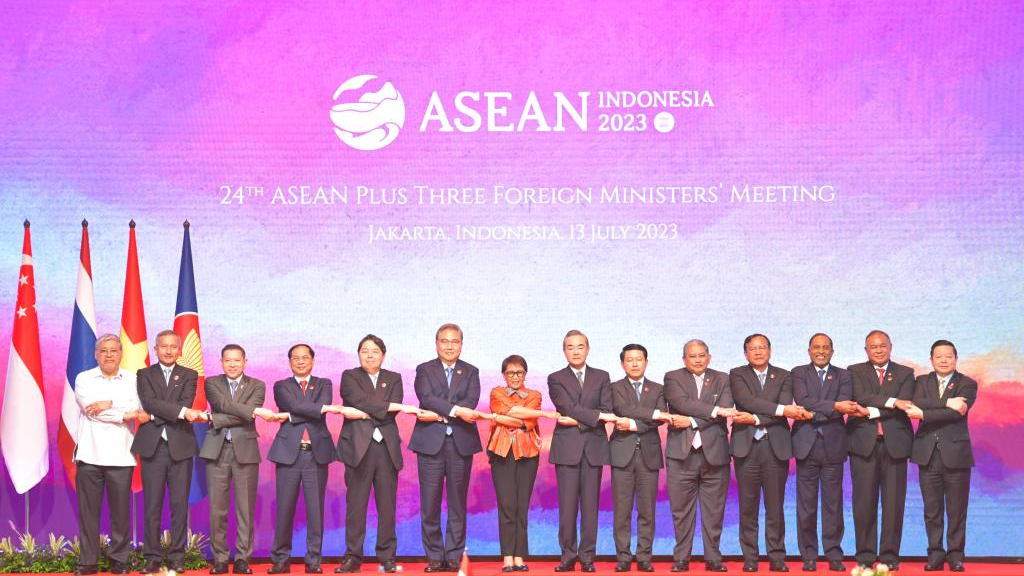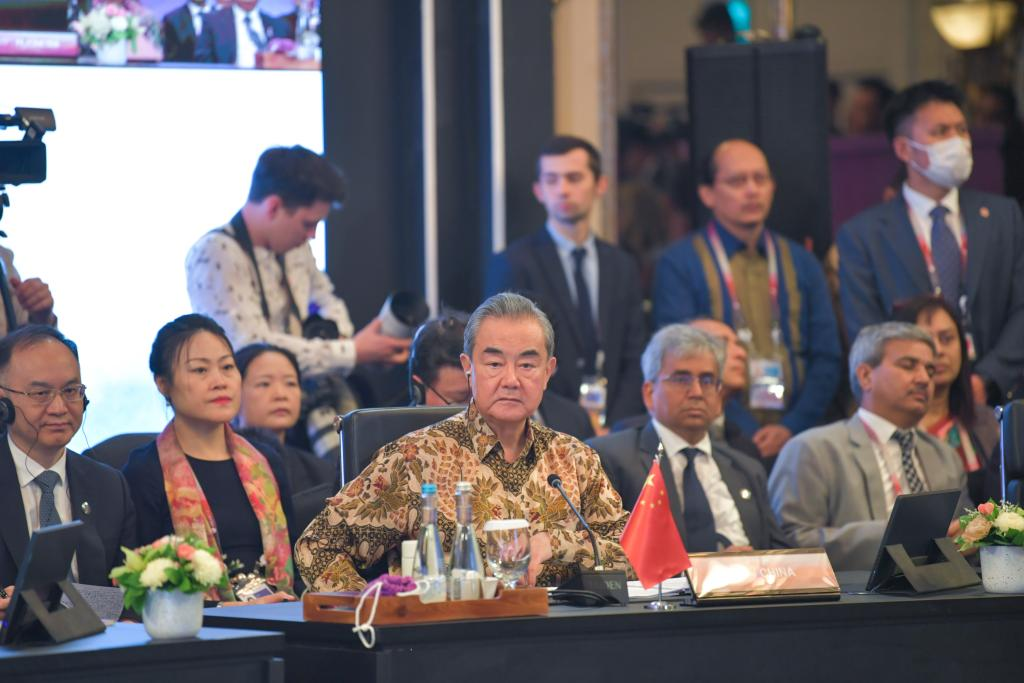
Wang Yi (7th R), director of the Office of the Central Commission for Foreign Affairs, attends the ASEAN Plus Three (APT) Foreign Ministers’ Meeting in Jakarta, Indonesia on July 13, 2023. /Xinhua
Wang Yi (7th R), director of the Office of the Central Commission for Foreign Affairs, attends the ASEAN Plus Three (APT) Foreign Ministers’ Meeting in Jakarta, Indonesia on July 13, 2023. /Xinhua
Editor’s note: CGTN’s special commentator, Emilia Fernandez, is a security and political analyst focusing on South Asian geopolitics and a PhD researcher at the University of Lucerne, Switzerland. The article reflects the views of the author and not necessarily those of CGTN.
Wang Yi, Director of the Office of the Central Foreign Affairs Commission, has just concluded a series of meetings with the Association of Southeast Asian Nations (ASEAN) foreign ministers in Jakarta.
Unlike every year, this year’s meetings have special significance as they mark the 20th anniversary of China’s accession to the Treaty of Amity and Cooperation (TAC) in Southeast Asia. Building the Silk Road and a more closely knit China-ASEAN community. As Sino-ASEAN relations are marked by a delicate balance of economic engagements, geopolitical issues and occasional tensions, now is the perfect time to examine Wang’s remarks at the ASEAN summit to decode the implications for regional and global peace and progress.
While attending the ASEAN-China Foreign Ministers’ Meeting, Wang praised the two sides’ wholehearted implementation of the objectives and principles of the TAC, a diplomatic agreement that promotes peaceful coexistence, regional stability and multilateral cooperation among signatory countries. China was the first of the major countries to join the TAC and establish a strategic partnership with ASEAN. Because of this interstate structure, China and ASEAN have over the past two decades emphasized peaceful solutions to conflicts and non-interference in domestic affairs.
Economically, China and ASEAN are each other’s largest trading partners, with trade volume expected to exceed $1 trillion this year, Wang said. Notably, China has become the fourth largest source of FDI among ASEAN countries. Wang sent a positive signal to strengthen business ties by urging China and ASEAN to accelerate negotiations on the development of the China-ASEAN Free Trade Area and the full implementation of the Regional Comprehensive Economic Partnership. Undoubtedly, ensuring free trade and open markets will bring new avenues to take Sino-ASEAN bonds to new heights.
In his remarks, Wang noted that China has reached an important consensus with ASEAN members and is working together to build a community with a shared future. It requires their joint efforts to pursue shared goals that transcend national interests to address common global challenges, ensure regional stability, enhance economic progress, and facilitate humanitarian, technical and development assistance.
Wang Yi (front), director of the Office of the Central Commission for Foreign Affairs, attends the Foreign Ministers’ Meeting of the 13th East Asia Summit in Jakarta, Indonesia, July 14, 2023. /Xinhua
Wang Yi (front), director of the Office of the Central Commission for Foreign Affairs, attends the Foreign Ministers’ Meeting of the 13th East Asia Summit in Jakarta, Indonesia, July 14, 2023. /Xinhua
The diplomat also noted the success of the Belt and Road Initiative (BRI) in completing key projects in ASEAN while bringing tangible benefits to over 2 billion people. The BRI is also expected to contribute to economic integration, trade and investment expansion, improved connectivity, increased people-to-people contact and cultural exchange among ASEAN members.
Wang agreed to speed up negotiations on a code of conduct in the South China Sea, welcomed the completion of its second reading, and pledged to play a constructive role in its initial conclusion. Not to mention, this thorn issue has often strained relations between China and ASEAN. Even as they bring the situation under control, outside powers are trying to use ASEAN as a proxy for a great power rivalry centered on the South China Sea issue. China and ASEAN must not allow this issue to become a deadlock in their diplomatic engagement. Furthermore, Wang highlighted China’s active participation and firm support for the ASEAN-centered regional cooperation framework.
ASEAN has long pursued a policy of engaging China while ensuring unity among its various members. ASEAN leaders understand that ensuring „centrality” depends on the effective engagement of China, the world’s second-largest economy and major power. On the other hand, China has always been an advocate of ASEAN’s centrality, unity and community-building in regional cooperation and actively participated in various ASEAN-led regional mechanisms.
As ASEAN emerges as an influential regional bloc and China’s rise as a global economic powerhouse gives their partnership the potential to shape the political, economic and security landscape of the Asia-Pacific region. Despite challenges in ASEAN-China relations that demand careful navigation, there are glimmers of hope for a prosperous future based on mutual respect and shared aspirations. Only through cooperation, they can unleash the true potential of their partnership and emerge as drivers of stability, peace and prosperity in the region.
Throughout the summit, Wang reminded ASEAN and other global powers of their collective responsibilities in upholding ASEAN’s centrality, addressing common global challenges, safeguarding the global free trade system and promoting true diversity.
(If you’d like to contribute and have specific expertise, please contact us at comments@cgtn.com. Follow @thouse_opinions (on Twitter to find the latest commentary in the CGTN comment section.)

. „Gracz. Namiętny pionier w mediach społecznościowych. Wielokrotnie nagradzany miłośnik muzyki. Rozrabiacz”.

